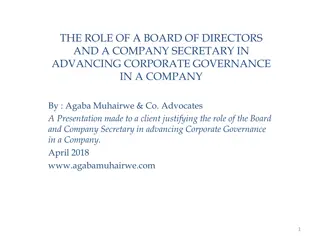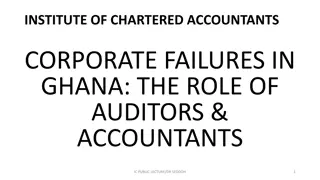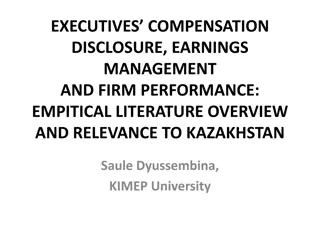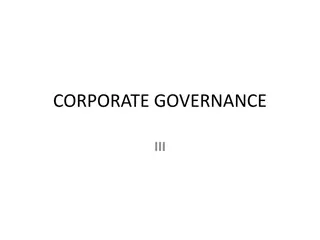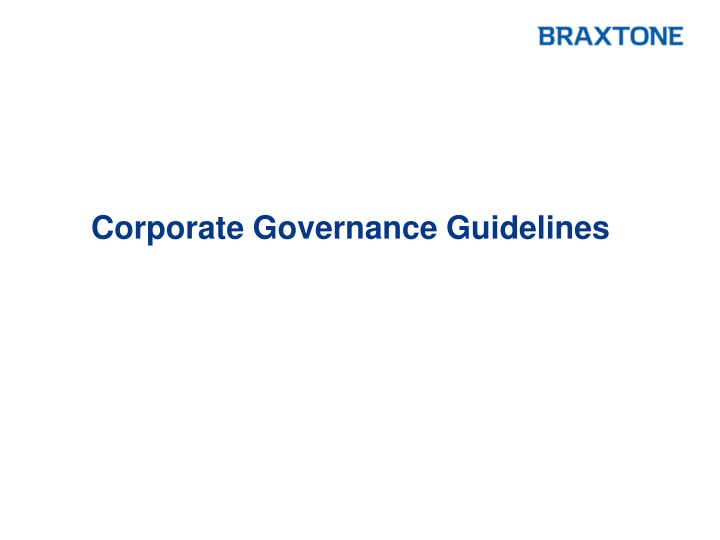
Corporate Governance Guidelines and Board Membership Requirements
Explore the Corporate Governance Guidelines covering operational standards, roles, responsibilities, and the importance of independent directors. Learn about the framework, strategic direction, risk management, and stakeholder protection. Dive into the requirements for board membership, including the skills needed, appointment process, and tenure.
Download Presentation

Please find below an Image/Link to download the presentation.
The content on the website is provided AS IS for your information and personal use only. It may not be sold, licensed, or shared on other websites without obtaining consent from the author. If you encounter any issues during the download, it is possible that the publisher has removed the file from their server.
You are allowed to download the files provided on this website for personal or commercial use, subject to the condition that they are used lawfully. All files are the property of their respective owners.
The content on the website is provided AS IS for your information and personal use only. It may not be sold, licensed, or shared on other websites without obtaining consent from the author.
E N D
Presentation Transcript
Table of Contents 1. Introduction 2. Operational Standards 3. Role and Responsibilities 4. Other Items 2
Introduction Purpose The purpose of the Corporate Governance policy is to define the minimum operational standards, and roles and responsibilities, pertaining to Corporate Governance. Scope The operational standards set out in the policy apply to Braxtone Insurance and Reinsurance Brokers Co. W.L.L. Tolerance Material breaches of the operational standards set forth in the policy will be regarded as serious and disciplinary action may be taken as appropriate. 3
Introduction (contd) Corporate Governance refers to the framework established by a company for the purpose of: determining the strategic direction of the company considering and approving business plans managing inherent risks monitoring performance ensuring appropriate corporate standards are established and maintained protecting the interests of stakeholders (notably: members, customers and employees) meeting its legal obligations and regulatory obligations, if applicable 4
Board Membership Independent Directors At least half of the members of the Board of Directors shall be Independent Directors. Wherever possible, former employees should be appointed to perform this role. Sign-off/Approval. Independent directors and independent advisors need to be interviewed and approved by the CEO/General Manager. Full background checks of independent directors and independent advisors (except former employees) shall be conducted prior to appointment. Contract Required. In the event that independent directors or independent advisors are required, such engagement should be documented in a formal contract. The Board should review the independence of each director at least annually in light of interests disclosed by them and their conduct. Each independent director shall provide the Board with all necessary and updated information for this purpose. 5
Board Membership Skill Set Presence of the appropriate level of skills and capability necessary to manage the Company, consistent with the standards set forth herein. Number At least four directors and at least half of the members of the Board of Directors shall be Independent Directors. Appointment The appointment of Directors is subject to prior screening by the Board of Directors and approval by the Shareholders and the Central Bank of Bahrain. The classification of executive , non- executive and independent non-executive directors is as per definitions stipulated by the Central Bank of Bahrain. Tenure Appointment should be on a three-year basis, subject to renewal. 6
Board Membership Removal A board member shall be removed or considered for removal from the Board of Directors in the following events: Fails to attend 75% of scheduled meetings of the Board without a lawful excuse; Resigns his office by virtue of a written request; If shareholders owning 10% or more of the Company s capital chose to dismiss such directors in accordance with Article 178 of Bahrain s Commercial Companies Law; If a Director was originally elected/appointed as an Independent Director and subsequent to his appointment the Director s independence is impaired; Misuse of his membership by conducting works in competition with those of the Company thereby causing damages to the company. Commitment and Attendance The Board of Directors shall meet at least four time each year. All members of the Board shall make every effort to attend Board meetings Each Board member should attend at least three meetings each year. Each Board member shall be sufficiently familiar with the business of the Company, including its financial statements, capital structure, risks and the competition it faces, to facilitate active and effective participation in the deliberations of the Board. Performance Evaluation The Board should evaluate its performance annually at or around the beginning of the calendar year. 7
Apportionment The Company s Corporate Governance framework shall provide for the apportionment of responsibility for all necessary and significant executive, business and operational functions, such that: the company s organizational structure and reporting lines are clearly defined and transparent reporting lines are free from conflict (of duties / authorities) roles, responsibilities and accountabilities are clearly defined those who have been apportioned responsibility for a function are sufficiently competent and maintain appropriate control mechanisms to discharge such function the performance of functions is subject to appropriate control mechanisms the performance of functions can be measured objectively the performance is routinely and consistently reported to the Board weaknesses, issues and failures raised through the reporting structure are considered and addressed the Board receives sufficient information to fulfil their respective functions 8
Roles and Responsibilities: Board Maintains ultimate authority for the management of the Company, subject to legal and regulatory requirements. Organizes and directs the affairs of the Company in a manner that seeks to maximize the value of the Company for the benefit of its shareholder(s), while complying with relevant legal and regulatory requirements and relevant corporate governance standards. Acts as advisers to the CEO/GM and senior management and oversee management s performance on behalf of the shareholder/member(s). In performing its general oversight function, the Board: Reviews and develops the company s strategic and business planning as well as management s approach to addressing significant risks and challenges facing the business; Determines the risk appetite of the company; and Reviews reports regularly submitted by management with respect to business performance, as well as significant events, issues and risks that may affect business or financial performance. 9
Roles and Responsibilities: Directors Principal responsibility: promote the success of the Company Duties: reasonable care, loyalty, skill and diligence when carrying out their Company duties. good faith to promote the success of the company for the benefit of shareholders, clients, employees and other key stakeholders. regard for the likely long-term consequences of any decision. Directors should be responsive to a wide array of factors and give proper consideration to any item, which they deem relevant to the success of the company. 10
Roles and Responsibilities: Secretary Pivotal in creating the conditions for overall Board and individual director effectiveness, both inside and outside the boardroom, by: setting the agenda, style and tone of Board discussions to promote effective decision- making and constructive debate in Board meetings, including appropriate consideration of strategic issues overseeing the preparation of an agenda for Board meetings in consultation with the CEO/GM overseeing the process of informing the Board through the distribution of information and reports in conjunction with the CEO/GM. ensuring that there is in place a properly constructed induction program for new directors that is comprehensive, formal and tailored, and working closely with the CEO/GM, providing support and advice on matters relevant to strategy and operations. 11
Roles and Responsibilities: CEO/GM Manages the day-to-day business of the Company, subject to the matters reserved for the Board and shall assist the Board in carrying out its role by providing advice and recommendations consistent with agreed corporate objectives, financial management and regulatory good practice. Principal responsibilities are to: supervise the development of and present to the Board, the Company s strategy and objectives including those relating to risk transfer and management, claims, marketing, distribution, financial control, systems and operations, within a framework that complies with legal and regulatory requirements supervise the development of appropriate capital, corporate and management structures to ensure that the Company s objectives can be met monitor the operational performance and strategic direction of the Company, including overall adherence to management budgets ensure that the members of the Board receive accurate, timely and clear information concerning the Company and its activities manage the corporate governance of the Company; be responsible for the financial management and achievement of budget of each business including profitability, productivity, direct and indirect costs, cash flow, investment and expense management manage the Company s business opportunities supervise the management of appropriate resources including employees and capital expenditure to ensure adequate support for all functions. Delegate, as necessary, to ensure compliance of each function with business strategy. Promote continuing professionalism among all key managers in regard to appropriate resourcing and budgetary challenges approve investments/divestments and major contracts, within authorized limits report regularly to the Company s Board with appropriate, timely and quality information so that it can discharge its responsibilities effectively approve headcount and salary reviews represent the Company to its member(s) customers, suppliers, government and regulators, and the community, in conjunction with the Chairman [if a separate officer] 12
Other Items Quorum Majority of the directors then in office, in attendance in person or by phone/video conference. Meeting Chair The Chairman or, if not present, by any director present. For such meeting, the chairman shall have the powers and authority of the Chairman. Minutes The proceedings, discussions and resolutions of the Board shall be recorded in minutes which shall be signed by the chairperson of the meeting and/or the Secretary. The minutes shall be kept in accordance with applicable law and should reflect decisions taken and succinct reference to discussions. The Secretary shall circulate the minutes of meetings of the Board to all members of the Board. Confidentiality The deliberations and resolutions of the Board are strictly confidential and shall be treated as such. 13
Other Items (contd) Conflicts of Interest All Board members shall declare their interests in matters to be decided by the Board and any other conflicts in accordance with applicable law. A Board member shall abstain from deliberating and voting with respect to a transaction or matter concerning the Company (or relevant group companies) in which he or she has a conflicting interest. Such Board member shall use best efforts to ensure that he or she does not receive any confidential information with respect to such transaction. Reporting Procedure The Chairman or his/her designee shall update the members of the Board as appropriate on the resolution of issues raised in previous Board meetings. 14







